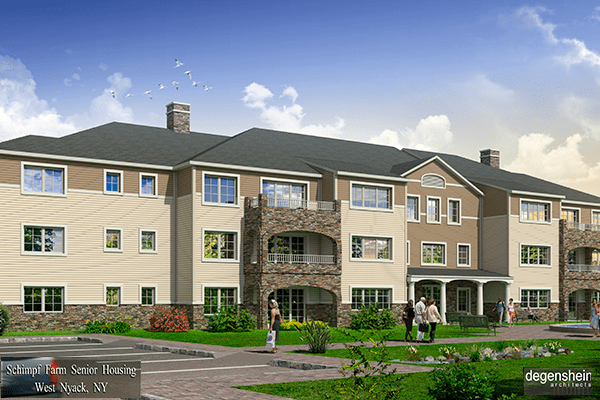|
RCBJ-Audible (Listen For Free)
|
Developers Will Have To Build Fewer Units If Code Is Amended
By Tina Traster
In response to residents’ concerns over a proliferation of high-density senior living projects, the Town of Clarkstown is seeking to amend its code to limit what developers can build.
Changes being considered could reduce the allowable number of units but increase the set-aside for parking. For now, the Clarkstown Planning Board has made recommendations, but the code amendments are ultimately up to the town board.
Clarkstown has seen a rush of applications for senior housing developments in the past couple of years including Buckley Farms, Schimpf Farm, and L’Dor. Another developer who plans to build a senior housing complex on North Main Street may have to adjust his plans to suit the new code provisions.
Members of CUPON, a citizen’s group that opposes overdevelopment, has raised concerns about traffic and the change in character of suburban pockets that become home to dense senior housing complexes with up to 200 units.
However, some planning board members worried that the restrictions would deter future developers from siting senior living in the town outside its hamlets. They acknowledge the delicate balance between giving seniors who live in town a place to live when they want to downsize with the sentiments of residents who oppose the change in their neighborhoods.
Specifically, two changes to the Senior Housing Special Permit Law are up for consideration.
Special permits for senior housing are only available in R-10, R-15, and R-22 zones, which are residential zones for single-family houses on approximately one-quarter or one-half acre sites.
A proposed change applies to the maximum density or number of permissible units per acre. The existing code allows for 20 units per acre for properties constructed and maintained by nonprofit entities, and 16 per acre for for-profit developments.
The Town Board recommended the Planning Board reduce the number of units per acre from 20 units to 16 units for non-profits and from 16 to 12 for for-profits, effectively a 20-25 percent reduction in density for Senior Housing Special Permits.
The changes apply to senior projects beyond the hamlet centers. Projects within hamlet centers that have a density of 21 units per acre would not be affected. Density in the AAR (Active Adult Residence), a “floating zone” that allows a total of 800 units town-wide, would not be affected by these proposed changes. Density in the AAR zone is determined by the zoning of adjacent sites to the parcel seeking AAR designation.
The second change concerns the number of off-street parking places within the projects, regardless of ownership. The current requirement is one to one-and-a-half parking places per unit, depending on the mix of one and two-bedroom units. The requested change was for 2.2 parking spaces per unit, regardless of size.
The parking calculations would affect both the Hamlet Centers and the R-10, R15 and R22 Special Permit zones.
Planning board member Phillip DeGaetano said the proposed restrictions and limitations on both density and parking were too onerous and would drive senior housing developers away.
Board Chairman Gil Heim agreed and proposed that Planning Board recommend that the change in density be rejected but felt the expansion of parking requirements be adopted and increased to 2.2 parking spaces per unit.
The Board considered the case of the former Champion Day Camp, which has yet to apply for a Senior Housing Special Permit. If the changes were made, the nine-acre site would be eligible for 108 units versus 144, a loss of 32 units. Plus, the developer would have to set aside an additional half-acre on the nine-acre parcel just to meet the incremental parking requirements. At 2.2 spaces per unit, the 108 units would need more than 1.6 acres of the nine-acre lot to comply with the minimum parking requirement.
Ultimately the Planning Board voted in favor or increasing parking but rejected the decrease in density. If the change passes the town board, the new code would apply to any property that has yet to receive final approval for its Special Permit.











